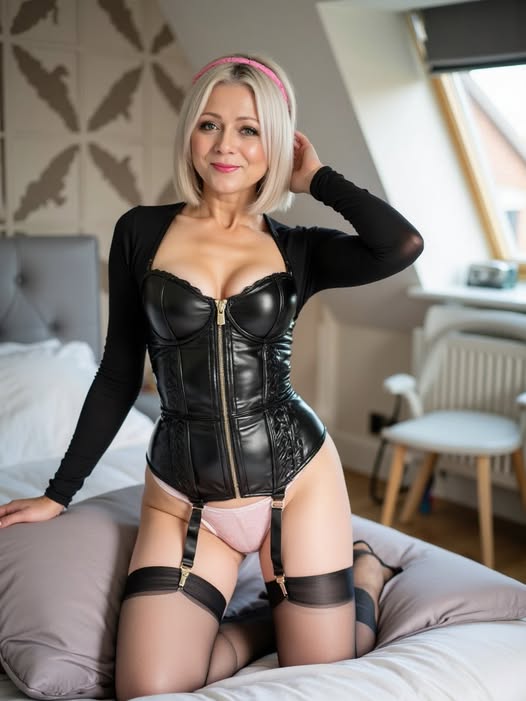Martha used to believe that age would make her invisible.
That after sixty, the world would stop looking at her the way it once did — with curiosity, with hunger, with that electric awareness that used to follow her through crowded rooms.
But time didn’t make her fade.
It made her eyes brighter. Sharper. More dangerous.
People didn’t realize it at first. They saw a polite older woman, silver hair swept into a neat bun, a calm voice that never rose. But if you met her gaze too long, something shifted. There was a pull there — quiet, magnetic — like she knew every secret you were trying to hide.
And maybe that’s because she’d spent a lifetime hiding her own.
Martha had been married once, for thirty-four years. He was kind, steady, safe. The kind of man you could depend on — but never tremble for. When he passed, she thought her heart had retired too.

Until she met Victor.
He was a painter, ten years younger, who moved into the apartment next door. Their first conversation was about the weather — but it lasted an hour. He kept glancing at her eyes, like he couldn’t decide what color they really were. Blue in sunlight. Gray in rain. A shade of something he couldn’t quite name.
And she noticed him noticing.
After that, she found herself lingering longer in the hallway. Asking about his work. Watching him through the half-open blinds as he painted — shirt sleeves rolled, lost in his world.
When their eyes met one evening, across that narrow hallway, something in her chest fluttered. Not lust. Not yet. Something quieter, but deeper — a warmth she’d forgotten existed.
The next time they had coffee, she laughed. Not the polite kind — a real, unguarded laugh that made her eyes crease and shine.
Victor stared.
“Your eyes,” he said, “they do something when you laugh. Like they light up from the inside.”
She looked down, smiling. “They tell on me, I suppose.”
He didn’t ask what they were telling.
He didn’t have to.
Because her eyes had started betraying her heart — every time he spoke softly, every time he leaned a little too close. Her pupils widened. Her lashes fluttered just enough to reveal the war inside her: the fear of being seen… and the ache of wanting to be.
One evening, he asked to paint her. She said no at first. Then yes, but only her face.
When he lifted the brush, she looked at him — not with the shy eyes of a woman unsure, but with the calm defiance of someone who’s lived enough to stop pretending.
“Don’t make me look young,” she said. “Make me look real.”
He did.
When he showed her the portrait, she didn’t see wrinkles.
She saw depth — every shade of longing, every quiet moment of surrender her eyes had ever given away.
She touched the canvas and whispered, “You saw me.”
He smiled. “You made it impossible not to.”
That night, as she walked home, Martha caught her reflection in a window. The city lights shimmered behind her. Her eyes — still bright, still restless — looked back with a question she no longer feared to ask:
What if this is what it means to be alive again?
Because the older she got, the less her heart cared about hiding — and the more her eyes began to confess everything she’d ever felt but never said.